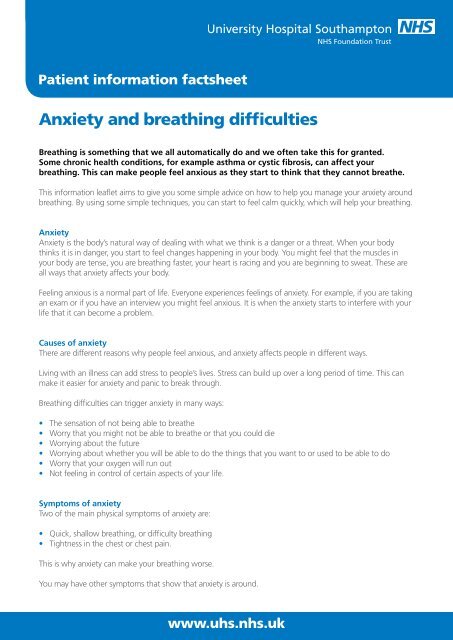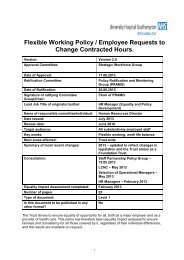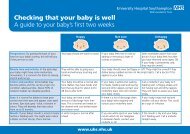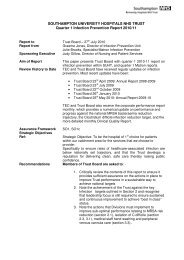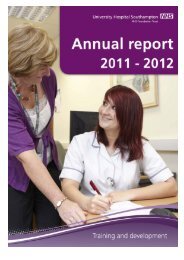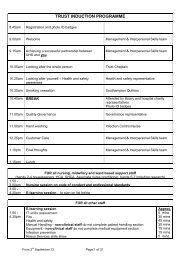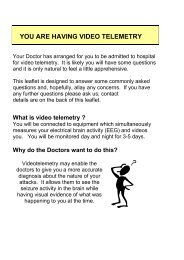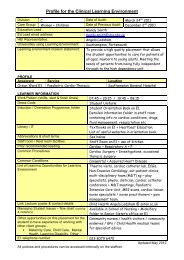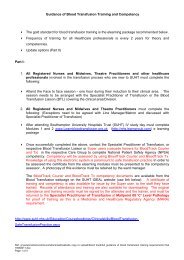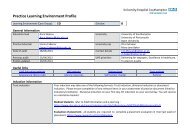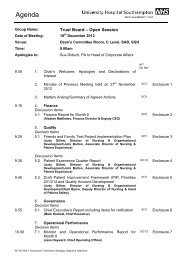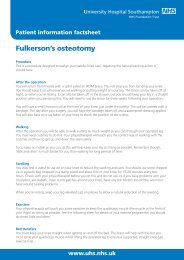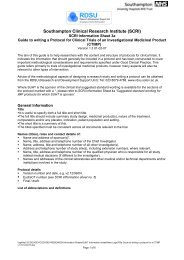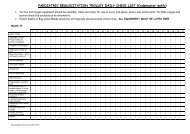Anxiety and breathing difficulties
Anxiety and breathing difficulties
Anxiety and breathing difficulties
Create successful ePaper yourself
Turn your PDF publications into a flip-book with our unique Google optimized e-Paper software.
Patient information factsheetPhysical symptoms of anxiety on the body• Rapid or pounding heart• Tight or aching muscles• Headaches, dizziness or feeling faint• Excessive sweating• Shaking or trembling• Pins <strong>and</strong> needles, especially in the h<strong>and</strong>s or around the mouth• Butterflies or a churning feeling in stomach or nausea• Loss of appetite• Passing urine frequently or diarrhoea.Effects of anxiety on thoughts <strong>and</strong> feelings• Constant worrying, fearing the worst or that the problem is permanent• Feeling on edge all the time• Thinking negatively• A sense of fear• Unable to concentrate• Feeling irritable <strong>and</strong> less patient than you were• Feeling preoccupied or obsessed with what you are worried about• Not noticing other things.<strong>Anxiety</strong> <strong>and</strong> <strong>breathing</strong>Some people experience panic attacks when they are feeling anxious. This is when the feelings of anxietybecome overwhelming <strong>and</strong> take over. You may feel like you might faint, be sick, you are <strong>breathing</strong> rapidly orthat you are finding it difficult to breathe.Rapid <strong>breathing</strong> is known as hyperventilating. Hyperventilation can be a normal response when you areanxious. Having a panic attack can be a very frightening <strong>and</strong> intense experience. The symptoms youexperience can be distressing. This often causes more anxiety, making things worse, which can be quiteuncomfortable <strong>and</strong> unpleasant. If you have <strong>difficulties</strong> <strong>breathing</strong> anyway, this is really scary as it feeds intoyour real worries about not being able to breathe.This diagram shows how a panic attack may be triggered when people start to feel short of breath <strong>and</strong> itscares them. They begin to have thoughts about not being able to breathe. Their body responds by <strong>breathing</strong>more quickly <strong>and</strong> this can make their chest feel more restricted. This in turn, makes the person feel even morepanicky <strong>and</strong> really believe that they will not be able to breathe or that they might collapse.www.uhs.nhs.uk
Patient information factsheetTriggerFor example, pushing yourself to go for a long walk <strong>and</strong> starting to feel more short of breathFeeling anxiousPanicBodyBreathing becomes rapid<strong>and</strong> chest becomes tightThoughts“I can’t breathe”This is what we call a vicious circle as the more anxious people get, the more they feel as if they cannot breathe.Breathing problems increase<strong>Anxiety</strong> increasesYou can break this cycle <strong>and</strong> reduce your anxiety by learning what helps you to cope or manage your anxiety.Learning to breathe properly can help with the panic attacks <strong>and</strong> reduce hyperventilating.How to cope with <strong>and</strong> manage anxietyGetting to know your anxiety<strong>Anxiety</strong> affects people in different ways. You need to underst<strong>and</strong> your own anxiety <strong>and</strong> then you can usedifferent techniques to help manage it. Initially, it is useful to ask yourself the following questions:• What things or situations trigger my anxiety? For example, it might be a physical sensation, or doingexercise, or thinking “is my <strong>breathing</strong> getting worse?”• What are my feelings <strong>and</strong> thoughts when I am anxious?• What do I tend to do when I am anxious?• What helps me to cope or lessen my anxiety?It might also be helpful to keep a record of when you are feeling anxious <strong>and</strong> make a note of how you feel,think <strong>and</strong> what you do in the situation. Once you have started to notice what invites anxiety in for you orlessens it, here are some ideas that might help.www.uhs.nhs.uk
Patient information factsheetRelaxing your <strong>breathing</strong>Some people find that their <strong>breathing</strong> becomes difficult when they are feeling anxious. Breathing techniquescan help to overcome feelings of breathlessness <strong>and</strong> manage anxiety. The tips below may be useful when your<strong>breathing</strong> becomes difficult:• If you starting to feel anxious, <strong>and</strong> you are beginning to have worrying thoughts, start by <strong>breathing</strong> out<strong>and</strong> empty your lungs as much as you can.• Breathing through your nose automatically slows your <strong>breathing</strong> down <strong>and</strong> helps to avoidhyperventilating.• Breathing into your abdomen by putting one h<strong>and</strong> on your chest <strong>and</strong> the other on your stomach. Asyou breathe in <strong>and</strong> out through your nose, the h<strong>and</strong> on your stomach should move, while the one on yourchest should keep as still as possible. By <strong>breathing</strong> into your abdomen, your diaphragm is stretched <strong>and</strong> yourelax the muscles that become tight that make it seem like it is difficult to breathe.• You could try:o Counting while you breathe, for example, by counting one <strong>and</strong> two for <strong>breathing</strong> in <strong>and</strong> three<strong>and</strong> four for <strong>breathing</strong> out. You may like to increase your counting, for example, three, four <strong>and</strong> five tobreathe out longer, to see if that helps. The counting helps to avoid rapid, panicky <strong>breathing</strong>.o Saying “re – lax” in your mind when you breathe, <strong>breathing</strong> in through your nose when saying“re” <strong>and</strong> out through your mouth when you say “lax”.For more information about <strong>breathing</strong> exercises, you can speak to the physiotherapists.Learning to relax your bodyWhen people start to feel anxious their body often starts to tense <strong>and</strong> their <strong>breathing</strong> quickens. Learningcontrolled <strong>breathing</strong> <strong>and</strong> muscle relaxation techniques can be really effective in decreasing anxiety.Relaxation involves sitting quietly <strong>and</strong> <strong>breathing</strong> slowly while relaxing the muscles in the body <strong>and</strong> clearingyour mind of all thoughts.• Here is an example of a quick relaxation technique you might like to try:1. Lie or sit down in a comfortable position, making sure your clothes are not too tight2. Try to breathe deeply <strong>and</strong> slowly, through your nose3. Starting from your toes, tighten the muscles as hard as you can <strong>and</strong> hold for a count of ten4. Relax <strong>and</strong> enjoy the feeling of release from the tension5. Spread out the muscles in your feet, hold for a count of ten <strong>and</strong> relax6. Repeat steps three to five, moving up through your body (legs, back, stomach, chest, h<strong>and</strong>s, arms,shoulders, neck, face). Tighten <strong>and</strong> relax the muscles as you go7. You may find listening to some relaxing music will help as well.• Using imagery – Some people find it useful to think about a time when they felt really good <strong>and</strong> calm.For example, it could be imagining your favourite walk or a scene which you find calming, such as a quietcountry scene, a beach or the sound of the sea. If you create a picture of this in your head <strong>and</strong> rememberall the feelings you had in your body, the smells that were around, the sounds you heard, anything youcould feel at the time <strong>and</strong> the thoughts you had it can make you feel calmer <strong>and</strong> more relaxed.You can get more information about this from the physiotherapists or psychologists. There are lots ofrelaxation tapes <strong>and</strong> books available; you can ask at your local library or bookshop.www.uhs.nhs.uk
Patient information factsheetUsing distraction (thinking about something else)Worrying about your <strong>breathing</strong> can make things seem worse <strong>and</strong> may lead to it becoming worse. Tryingto relax or distracting yourself may help to ease your <strong>breathing</strong> problems. Distraction techniques are whenyou do something else or focus on something else rather than worrying. This can really help you feel lessanxious if you decide to use it as a strategy, rather than other people trying to distract you.Some examples could be:• Listening to music• Reading a book or magazine• Watching TV• Going outside in the fresh air or opening a window.Reassuring yourself <strong>and</strong> checking out what you are thinkingAnxious thoughts often focus on <strong>difficulties</strong> that people are experiencing at the time (e.g. “My chest isreally tight”) but then become more negative <strong>and</strong> catastrophic as the person becomes more anxious (suchas “I cannot breathe”).As well as using the strategies above to calm your body, you can use some of the ideas below to help calmyour thoughts <strong>and</strong> mind.• Have I been in this situation before? What happened? Is there anything different between this situation<strong>and</strong> previous ones like it?• When I have felt this way in the past, what did I think about or do that helped me feel better?• Have I had any experiences (or is there anything at this moment in time) that shows me that this thoughtis not completely true?• If my best friend or someone I loved had this thought, what would I tell them?• If my best friend or someone who loves me knew I was thinking this thought what would they say tome? What evidence might they point out to me to suggest that the thought is not 100% true?• Are there any strengths or positives in me or the situation that I am ignoring?• Am I...o catastrophising (thinking the worst),o fortunetelling (predicting the future),o constantly asking “what if” (which never offers a satisfactory answer)o or only noticing the negatives (focusing only on what you cannot do)?If you find it is certain situations that make you feel anxious, you could use these questions to think abouthow to respond to the anxiety next time. Some people like to write down either questions or reassuringstatements to help them when they get panicky.For example, you could write down some positive statements to help keep calm:• I have experienced panic before <strong>and</strong> have survived• I have skills to reduce my anxiety• I can calm my <strong>breathing</strong> really quickly if I concentrate on my <strong>breathing</strong>• I can cope.www.uhs.nhs.uk


